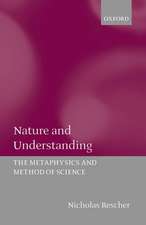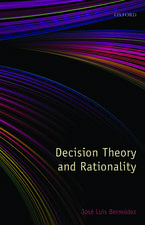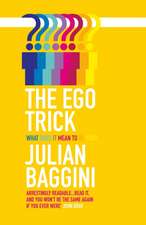Value Reasoning: On the Pragmatic Rationality of Evaluation
Autor Nicholas Rescheren Limba Engleză Hardback – 21 iul 2017
This book is a survey of key issues in the theory of evaluation aimed at exhibiting and clarifying the rational nature of the thought-procedures involved. By means of theoretical analysis and explanatory case studies, this volume shows how evaluation is—or should be—a rational procedure directed at appropriate objectives. Above all, it maintains the objectivity of rational evaluation.
| Toate formatele și edițiile | Preț | Express |
|---|---|---|
| Paperback (1) | 445.33 lei 6-8 săpt. | |
| Springer International Publishing – 13 mai 2018 | 445.33 lei 6-8 săpt. | |
| Hardback (1) | 451.48 lei 6-8 săpt. | |
| Springer International Publishing – 21 iul 2017 | 451.48 lei 6-8 săpt. |
Preț: 451.48 lei
Nou
Puncte Express: 677
Preț estimativ în valută:
86.39€ • 90.20$ • 71.50£
86.39€ • 90.20$ • 71.50£
Carte tipărită la comandă
Livrare economică 04-18 aprilie
Preluare comenzi: 021 569.72.76
Specificații
ISBN-13: 9783319541389
ISBN-10: 3319541382
Pagini: 143
Ilustrații: X, 147 p. 17 illus.
Dimensiuni: 148 x 210 x 15 mm
Greutate: 0.35 kg
Ediția:1st ed. 2017
Editura: Springer International Publishing
Colecția Palgrave Macmillan
Locul publicării:Cham, Switzerland
ISBN-10: 3319541382
Pagini: 143
Ilustrații: X, 147 p. 17 illus.
Dimensiuni: 148 x 210 x 15 mm
Greutate: 0.35 kg
Ediția:1st ed. 2017
Editura: Springer International Publishing
Colecția Palgrave Macmillan
Locul publicării:Cham, Switzerland
Cuprins
1. Value Basics.- 2. Value Attribution.- 3. Rational Choice and Value Complementarity.- 4. Integration Problems.- 5. Rationality Issues.- 6. Rational Choice and Merit Complementarity.- 7. Circularity Issues.- 8. Evaluating Cognitive Significance.- 9. Epistemic Evaluation.- 10. Allocating Scientific Credit.- 11. Evaluating Contention Tenacity.
Notă biografică
Nicholas Rescher is Distinguished University Professor of Philosophy at be University of Pittsburgh where he has also served as Chairman of the Philosophy Department and a Director of the Center for Philosophy of Science.
Textul de pe ultima copertă
This book is a survey of key issues in the theory of evaluation aimed at exhibiting and clarifying the rational nature of the thought-procedures involved. By means of theoretical analysis and explanatory case studies, this volume shows how evaluation is—or should be—a rational procedure directed at appropriate objectives. Above all, it maintains the objectivity of rational evaluation.
Caracteristici
Book represents a new topic explained by a prominent philosopher Outlines basic principles for evaluating excellence Illustrates the principles with four examples, called “cognitive importance, allocating scientific credit, actions, and contention tenacity”


















